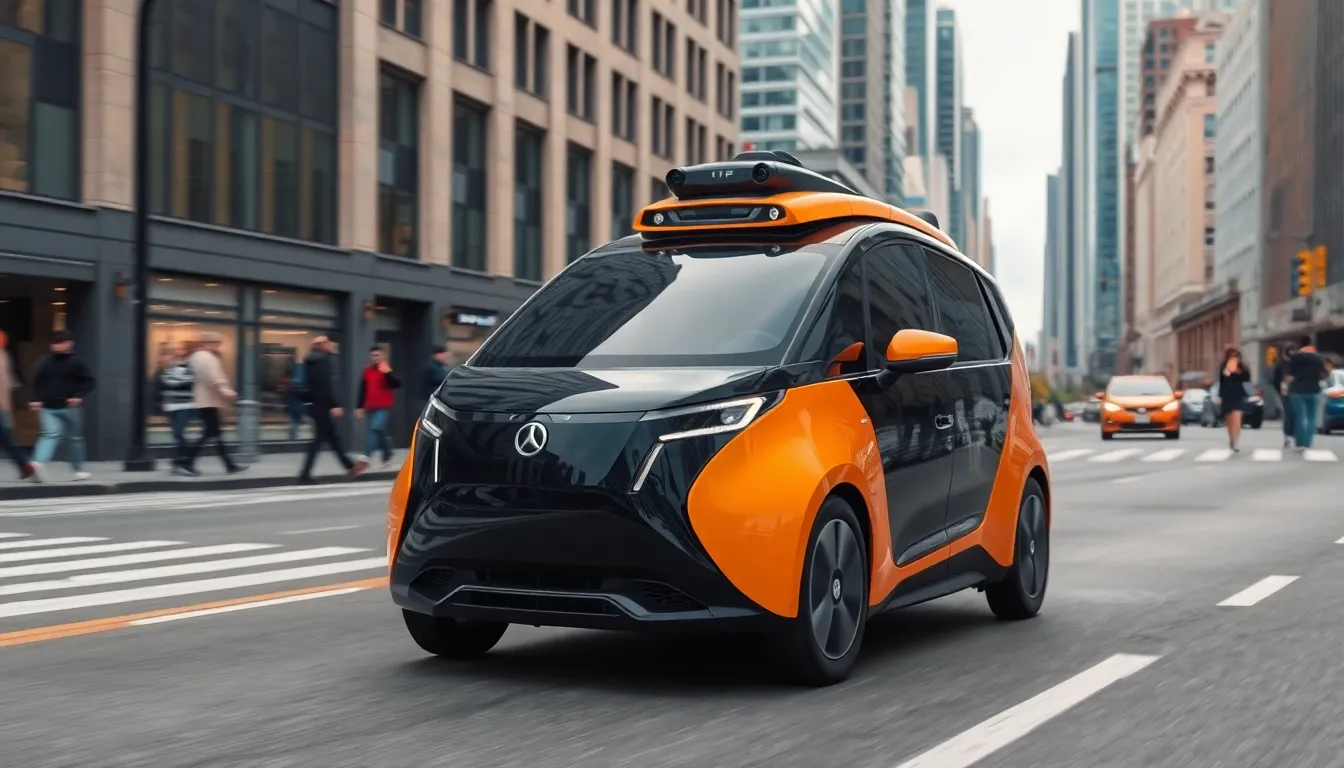Table of Contents
ToggleArtificial intelligence is revolutionizing the automotive industry, transforming how vehicles are designed, manufactured, and driven. From self-driving cars to intelligent traffic management systems, AI technologies are enhancing safety, efficiency, and the overall driving experience. As automakers embrace these innovations, they’re not just keeping pace with technological advancements but also reshaping the future of transportation.
The integration of AI in automotive applications is driving significant changes in vehicle performance and user interaction. Advanced algorithms analyze vast amounts of data, allowing cars to adapt to their environments and respond to drivers’ needs in real-time. This shift not only promises to make roads safer but also paves the way for smarter cities and sustainable mobility solutions. As the industry continues to evolve, understanding the impact of AI on automotive technology becomes crucial for consumers and stakeholders alike.
Overview of AI in Automotive
AI significantly reshapes the automotive landscape through various applications that enhance vehicle performance and user experience. AI optimizes vehicle design by utilizing data-driven insights to inform material choices and aerodynamic profiles, leading to safer and more efficient automobiles.
AI facilitates advancements in self-driving technology. Autonomous vehicles incorporate AI algorithms that analyze real-time data from sensors and cameras, enabling them to navigate complex environments. Companies like Waymo and Tesla exemplify AI’s role in achieving Level 4 and Level 5 autonomy, where vehicles operate without human intervention under specific conditions.
AI also enhances intelligent traffic management systems. These systems utilize algorithms to monitor traffic flows, assess congestion levels, and optimize traffic light patterns, resulting in reduced travel times and lower emissions. Integrating AI with existing infrastructure fosters smarter urban environments.
AI improves user interaction through voice recognition and personalized in-car assistants. Advanced systems can adapt to driver preferences and suggest routes based on real-time data. This personalization elevates the overall driving experience, aligning with contemporary consumer demands for technology integration.
As the automotive sector adopts AI technologies, industry stakeholders must stay informed about its transformative potential. Understanding AI’s capabilities paves the way for innovative solutions that address challenges like safety, sustainability, and urban mobility.
Applications of AI in Automotive

AI drives numerous innovations within the automotive sector, significantly enhancing vehicle functionality and user experiences. Key applications include autonomous vehicles, driver assistance systems, and predictive maintenance solutions.
Autonomous Vehicles
Autonomous vehicles leverage AI to interpret data from sensors and cameras for navigation. They process vast amounts of information in real-time, allowing them to adapt to dynamic environments. Companies like Waymo and Tesla exemplify this technology by achieving levels of autonomy that reduce the need for human intervention, improving safety and convenience. These vehicles utilize machine learning algorithms, enabling them to learn from experiences and refine their navigation strategies continuously.
Driver Assistance Systems
Driver assistance systems utilize AI to create safer driving conditions by enhancing vehicle capabilities. Features such as adaptive cruise control, lane-keeping assistance, and automatic emergency braking rely on AI-powered analyses of surrounding environments. These systems process data from various sensors, enhancing the driver’s situational awareness and minimizing the risk of accidents. Statistically, vehicles equipped with advanced driver assistance technologies report decreased crash rates, highlighting their relevance in improving road safety.
Predictive Maintenance
Predictive maintenance employs AI to forecast vehicle maintenance needs. By analyzing data from various components, AI algorithms identify patterns that predict potential failures. This approach allows manufacturers and owners to address issues before they escalate, ensuring optimal vehicle performance. Automotive companies increasingly adopt predictive maintenance strategies, leading to reduced downtime and lower repair costs, ultimately enhancing customer satisfaction.
Benefits of AI in Automotive
AI’s integration into automotive technology offers numerous advantages, significantly impacting safety, efficiency, and cost management in the industry.
Enhanced Safety
AI enhances safety through advanced driver assistance systems (ADAS) that incorporate features like automatic emergency braking and lane-keeping assist. These systems utilize real-time data from cameras and sensors to detect potential hazards and respond proactively. For example, Tesla’s Autopilot and Waymo’s self-driving systems demonstrate how AI processes vast datasets to reduce accident risks. AI’s machine learning capabilities continuously improve these systems based on driving patterns and environmental conditions, leading to safer driving experiences overall.
Improved Efficiency
AI optimizes efficiency in automotive operations and driving experiences. Intelligent traffic management systems use AI algorithms to analyze traffic patterns, facilitating better signal control and reducing congestion. For instance, cities employing AI-driven traffic systems experience up to a 30% decrease in travel times. Additionally, AI enhances fuel efficiency by optimizing driving behaviors and vehicle performance through data analysis, allowing vehicles to adjust to changing road conditions and reduce fuel consumption.
Cost Reduction
AI contributes to cost reduction across various aspects of the automotive industry. Predictive maintenance solutions leverage AI to forecast when vehicle components require servicing, leading to fewer breakdowns and extending vehicle lifespans. According to industry reports, implementing predictive maintenance can lower maintenance costs by 20-30%. Furthermore, AI-driven manufacturing processes streamline production, reduce waste, and minimize labor costs, increasing overall profitability for manufacturers.
Challenges of AI in Automotive
Despite the advancements in AI within the automotive sector, several challenges hinder its full potential. Data privacy concerns and technology limitations pose significant obstacles.
Data Privacy Concerns
Data privacy concerns emerge as AI systems gather vast amounts of personal and location data. Vehicle manufacturers and software developers collect information from users to enhance functionalities like navigation and predictive maintenance. Compliance with data protection regulations, such as the General Data Protection Regulation (GDPR), becomes critical to avoid legal consequences. Consumers express fears regarding how data is used and shared, highlighting the need for transparency and robust data security measures to protect user information.
Technology Limitations
Technology limitations currently affect the deployment of AI in automotive applications. Limitations in sensor accuracy and the need for high-definition mapping contribute to challenges in achieving fully autonomous vehicles. Environmental factors, such as weather conditions and complex road situations, can impede AI performance. Additionally, reliance on internet connectivity for real-time data processing introduces vulnerability in areas with limited network coverage. Efforts to improve the reliability and adaptability of AI systems continue to be crucial for overcoming these technological barriers.
Future Trends in AI in Automotive
AI in automotive continues to evolve, presenting several future trends that shape the industry’s trajectory.
- Enhanced Autonomous Driving
Enhanced levels of autonomy are likely to emerge through advanced machine learning techniques. Vehicles will increasingly exhibit higher degrees of self-sufficiency by integrating sensor fusion technology, allowing them to operate safely in diverse environments. Progress in AI algorithms will enable vehicles to learn from real-world driving scenarios, leading to adaptive behaviors that improve overall safety.
- Smart Infrastructure Integration
Smart infrastructure will become pivotal in improving urban mobility. AI will facilitate communication between vehicles and traffic systems, optimizing traffic flow and reducing congestion. Cities implementing AI-driven traffic signals and road sensors can expect travel time reductions of up to 25%. Such advancements will create seamless interactions between vehicles and urban landscapes.
- Personalized User Experiences
Personalized user experiences will gain prominence through AI-powered systems. Vehicles will utilize data analytics to provide customized driving experiences, including tailored infotainment options and adaptive seating configurations. Machine learning can forecast driver preferences, improving comfort and engagement levels during travel.
- Sustainability Innovations
AI will play a key role in sustainability innovations within the automotive sector. Intelligent energy management systems will enhance electric vehicle (EV) efficiency by predicting power needs and optimizing charging schedules. By maximizing battery performance and minimizing energy consumption, manufacturers can achieve significant reductions in carbon footprints.
- Predictive Maintenance Evolution
Predictive maintenance techniques will further evolve, leveraging real-time monitoring and advanced analytics to anticipate mechanical issues. Through continuous data collection from sensors, AI systems will identify potential failures before they arise, enabling timely maintenance interventions. This evolution may decrease unplanned downtime by 40%, enhancing vehicle reliability.
- AI-Driven Safety Features
AI-driven safety features are set to expand, with continued improvements in advanced driver assistance systems (ADAS). Vehicles will include innovations such as automatic hazard detection and emergency response systems that utilize deep neural networks for real-time decision-making. As a result, accident rates could decline substantially.
- Regulatory Compliance Innovations
AI advancements will also focus on addressing regulatory compliance concerns regarding data privacy. Incorporating robust encryption and anonymization techniques will enhance data security while ensuring compliance with regulations like GDPR. The automotive sector can foster consumer trust by prioritizing ethical AI practices.
These emerging trends illustrate the significant role AI will play in transforming the automotive industry, promoting safety, efficiency, and sustainability in the coming years.
The automotive industry’s future is undeniably intertwined with artificial intelligence. As AI continues to evolve it will drive innovations that enhance safety efficiency and sustainability. The integration of AI technologies not only improves vehicle performance but also enriches the overall driving experience.
Challenges remain particularly in data privacy and technology limitations but ongoing advancements promise to address these issues. As the sector embraces AI the potential for smarter vehicles and more efficient urban mobility becomes clearer. This transformation will shape the automotive landscape for years to come ensuring that both consumers and industry stakeholders benefit from a safer and more connected driving environment.




